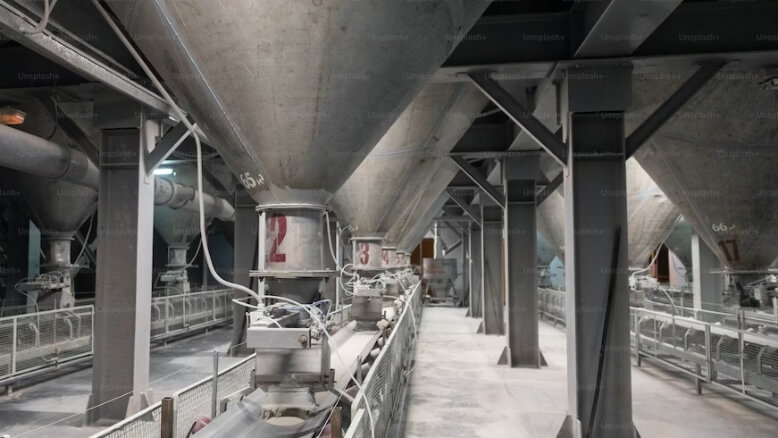Digitalizing Procurement: Unlocking Efficiency in the Cement Industry

Digital procurement is reshaping the cement industry’s landscape, ringing in a new era of optimization and agility powered by Industry 4.0. Amidst evolving market dynamics, changing consumer demand, and supply chain challenges, cement manufacturers are turning to technology-driven procurement solutions to reduce costs, increase efficiencies, and improve their performance for an added competitive edge.
By digitalizing their supply chain, companies can experience a 20% and 50% reduction in their procurement and supply chain costs, respectively, supplemented with a 10% revenue rise.1Below, we outline the transformative impact of adopting procurement automation on the fortunes of cement companies.
The Power of Automation in Streamlining Procurement Processes
By combining the latest technologies, including artificial intelligence (AI) and the Industrial Internet of Things (IIoT), cement manufacturers can effectively streamline their procurement processes, which are significantly affected by commodity prices, energy consumption, and supplier management. Digital procurement ensures that the cement industry gains holistic visibility into its supply chain, encouraging efficient logistics operations and fostering a resilient, sustainable, and profitable future.
- Enhanced Visibility for Effective Raw Material Procurement
As cement production entails procuring several raw materials, namely limestone, gypsum, coal, and clay, which are spread across diverse geographies and suppliers, ensuring a reliable raw material supply becomes imperative, especially to meet the varying quality standards of different cement types.
To avoid the pitfalls of poor transportation infrastructure, unfavorable weather conditions, and complex government regulations, procurement leaders must adopt digital solutions that enhance supply chain visibility. Real-time tracking can provide end-to-end transparency into the sourcing and delivery processes, ensuring steady flow and enabling production optimization.
2. Improved Inventory Management Down to the Silo
Cement manufacturers are no exception to the uncertainties involved in forecasting supply-demand scenarios. In fact, ensuring there are adequate inventories to meet any sudden demand surge becomes even more significant for companies dealing in both bagged and bulk cement, given the consumer preference for “fresh cement”. Besides, handling coal and the end product’s quality is no easy task.
Procurement optimization assists manufacturers in analyzing their exclusive data sources, including point-of-sale data, stock-outs, pic pack loads, and tracking activities, through predictive analytics. This provides a true picture of customer demand, ensuring better demand forecasting, accurate inventory management, and zero-error predictive plant maintenance.
By embracing procurement solutions such as automated requisitioning, purchase order generation, and invoice processing, cement manufacturers can minimize the scope for manual errors, increase process speed, and undertake better resource allocation.
3. Streamlined Logistics Operations to Meet Demand with Precision
Cement is a high-volume, low-value commodity, which makes handling its logistics complex and costly. Entailing large volumes (cement is bulky) and specialized handling equipment such as bulk carriers and cement tankers, transporting cement efficiently from the manufacturing plant to the distributors becomes essential. Logistics costs also increase when extreme weather disrupts transportation routes and affects cement carriers, thereby requiring maintenance—an even graver concern in remote locations.
IIoT, in conjunction with big data analytics and machine learning, detects operational and logistics inefficiencies by undertaking historical data analysis, thereby enhancing traceability and improving supply chain resilience. By leveraging procurement optimization tools, such as automated tracking and optimized route planning, cement manufacturers can precisely monitor product movement, minimize lead times, and shorten time to market.
4. Seamless Vendor Management for Superior Supplier Relationships
Given the scenario that cement manufacturers must source various kinds of raw materials from different vendors, handling supplier relationships can be daunting. Besides, in the aftermath of the supply chain disruptions caused by the COVID-19 pandemic, maintaining supplier diversity has become even more important. Additionally, with sustainability and ESG compliance becoming all the rage, ensuring that your suppliers are conscious of their footprint makes good business sense.
Cement manufacturers can foster better supplier collaboration and communication by embracing procurement automation solutions. Developing clear metrics for supplier performance evaluation also helps with cost optimization. By leveraging digital technologies, manufacturers can facilitate competitive bidding, ensuring favorable terms are negotiated and a reliable supply chain is established.
Embracing Moglix’s Digital Procurement Solutions to Unleash Higher Efficiency
Adopting digital procurement solutions can truly revolutionize a cement manufacturer’s processes by streamlining its inventory, logistics, and supplier relationships. By harnessing data-driven insights from procurement automation, cement manufacturers can optimize their processes, make informed decisions, and establish agile supply chains.
Moglix’s procurement solutions take this a step further by facilitating the implementation of strategic procurement processes that drive down costs and minimize supply chain risk, as substantiated by the 20% increase in working hour efficiency achieved by a leading cement manufacturer after deploying Moglix’s solutions.
The client had several business challenges, including a fragmented supplier base, non-standardized price and delivery systems, and decentralized platforms, which increased tail-end spending and resulted in data gaps. This not only made it difficult to undertake purchase analytics but also delayed tax filing, causing compliance issues. Moglix automated the procurement processes to deal with the issues of distributed pricing, re-orders, and product duplication, enabling massive cost savings. Download the case study to learn more.
